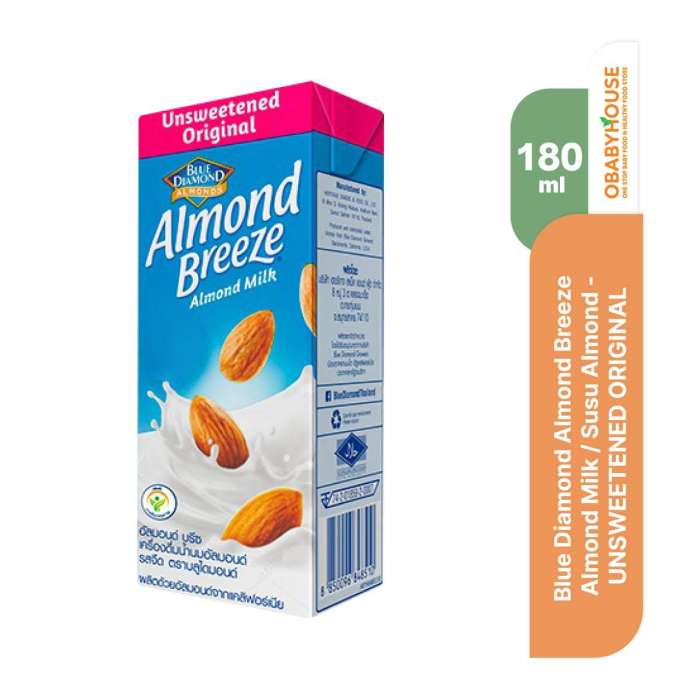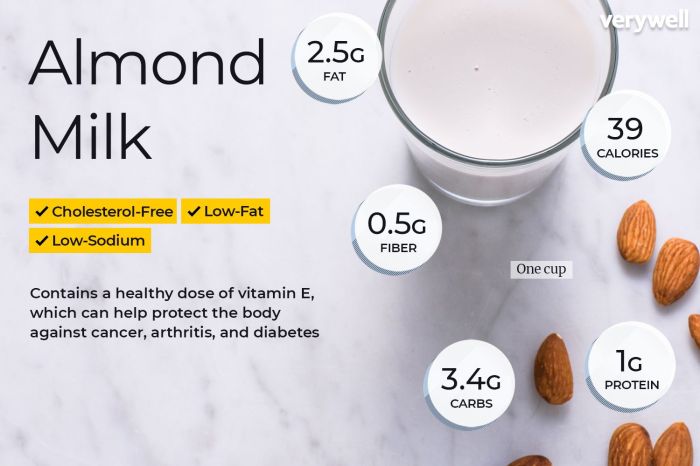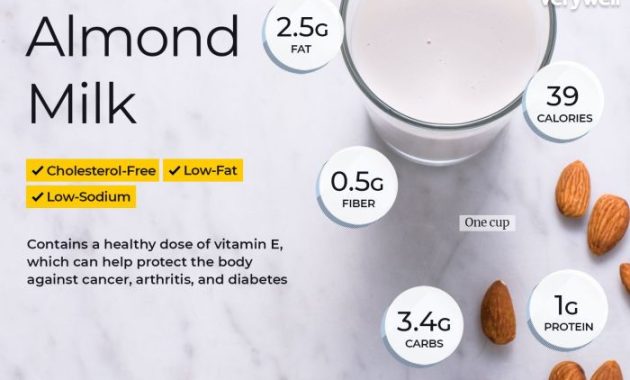Almond Breeze Almond Milk Nutritional Profile

Almond milk almond breeze nutrition facts – Almond Breeze almond milk has become a popular dairy alternative, offering a creamy texture and a variety of flavors. Understanding its nutritional content is crucial for making informed dietary choices. This section provides a detailed analysis of the nutritional profile of Almond Breeze almond milk, comparing it to traditional dairy options and exploring variations across different flavors.
Nutritional Breakdown of Almond Breeze Original Unsweetened Almond Milk
The following table presents the nutritional information for a single serving (approximately one cup, or 240ml) of Almond Breeze Original Unsweetened almond milk. Note that nutritional values can vary slightly depending on the manufacturing batch and source. Always refer to the packaging for the most accurate and up-to-date information.
Almond Breeze almond milk, a popular plant-based alternative, boasts a relatively low calorie and fat content, often fortified with vitamins and minerals. However, comparing its nutritional profile to the carbohydrate and sugar load of a McDonald’s Strawberry Banana Smoothie, as detailed in strawberry banana smoothie mcdonald’s nutrition facts , highlights the significant difference in caloric density. Returning to Almond Breeze, its lower sugar content makes it a suitable choice for individuals monitoring their sugar intake.
| Name | Amount | Unit | % Daily Value |
|---|---|---|---|
| Calories | 30 | kcal | ~2% |
| Total Fat | 2.5 | g | ~4% |
| Saturated Fat | 0 | g | ~0% |
| Trans Fat | 0 | g | – |
| Cholesterol | 0 | mg | ~0% |
| Sodium | 160 | mg | ~7% |
| Total Carbohydrate | 1 | g | ~1% |
| Dietary Fiber | 1 | g | ~4% |
| Total Sugars | 0 | g | – |
| Protein | 1 | g | ~2% |
| Vitamin D | 2mcg | mcg | ~10% |
| Calcium | 450 | mg | ~45% |
| Potassium | 170 | mg | ~4% |
| Vitamin E | 1.5mg | mg | ~10% |
Comparison of Almond Breeze Almond Milk to Whole and Skim Milk
This section compares the nutritional profile of Almond Breeze Original Unsweetened almond milk to that of whole milk and skim milk to highlight key differences. These comparisons are based on average values and can vary depending on the brand and type of milk.
The following bullet points summarize the key nutritional differences:
- Calories: Almond Breeze almond milk is significantly lower in calories than both whole milk (approximately 150 kcal per cup) and skim milk (approximately 90 kcal per cup).
- Fat: Almond Breeze almond milk has less total fat than whole milk but a similar amount to skim milk. However, the type of fat differs significantly; almond milk contains mostly unsaturated fats, while dairy milk contains saturated fats.
- Protein: Almond Breeze almond milk is considerably lower in protein than both whole milk and skim milk.
- Carbohydrates: Almond Breeze almond milk has fewer carbohydrates than both whole milk and skim milk.
- Calcium and Vitamin D: Many brands of almond milk, including Almond Breeze, are fortified with calcium and vitamin D to match or exceed the levels found in dairy milk.
Nutritional Differences Across Almond Breeze Varieties, Almond milk almond breeze nutrition facts
Almond Breeze offers various flavors, including vanilla and chocolate. These additions affect the overall nutritional profile, primarily by increasing the sugar and calorie content.
| Almond Breeze Variety | Calories (approx. per cup) | Sugar (approx. per cup) | Fat (approx. per cup) |
|---|---|---|---|
| Original Unsweetened | 30 | 0g | 2.5g |
| Vanilla | 40-50 | 5-7g | 2-3g |
| Chocolate | 50-60 | 7-9g | 2-3g |
Note: These values are approximate and can vary depending on the specific product and serving size. Always check the nutrition label on the package for the most accurate information.
Macronutrient Content and Health Implications: Almond Milk Almond Breeze Nutrition Facts

Almond Breeze almond milk, like many plant-based milk alternatives, presents a unique macronutrient profile with implications for overall health. Understanding its fat, protein, and carbohydrate content is crucial for making informed dietary choices and appreciating its potential benefits and drawbacks within a balanced diet. This analysis will delve into the specifics of these macronutrients and their impact on various aspects of well-being.
The fat content in Almond Breeze almond milk, while varying slightly depending on the specific variety (unsweetened, vanilla, etc.), generally consists primarily of unsaturated fats, particularly monounsaturated and polyunsaturated fats. These are considered “good” fats and are associated with improved heart health by potentially lowering LDL (“bad”) cholesterol levels and raising HDL (“good”) cholesterol levels. However, it’s important to note that while unsaturated fats offer health benefits, excessive consumption of any type of fat can contribute to weight gain if not balanced with overall caloric intake and physical activity.
The relatively low fat content in Almond Breeze compared to whole cow’s milk, therefore, presents a potential advantage for individuals aiming to manage their fat intake. However, for those requiring higher calorie intake or looking to maximize their dietary fat intake from other sources, Almond Breeze may not be the optimal choice.
Fat Content and Cardiovascular Health
The predominance of unsaturated fats in Almond Breeze almond milk contributes positively to cardiovascular health. Studies have shown a correlation between diets rich in monounsaturated and polyunsaturated fats and a reduced risk of heart disease. The absence of saturated and trans fats, often found in higher quantities in dairy milk, further enhances the heart-health profile of almond milk.
However, individuals with pre-existing cardiovascular conditions should still consult with their healthcare providers to determine the appropriate level of fat consumption in their diets. The fat content in almond milk should be considered in the context of a holistic dietary approach rather than as an isolated factor.
Protein and Carbohydrate Content and Energy Levels
Almond Breeze almond milk contains a moderate amount of protein and carbohydrates. The protein content contributes to satiety, helping to keep you feeling fuller for longer. This is particularly relevant for individuals seeking a plant-based protein source. The carbohydrates provide energy, but the glycemic index is generally low, meaning they don’t cause a rapid spike in blood sugar levels.
This is beneficial for individuals managing diabetes or those seeking to maintain stable energy levels throughout the day. However, it is important to note that the protein and carbohydrate levels are relatively lower compared to dairy milk, potentially necessitating supplemental protein sources in a vegetarian or vegan diet.
Fiber Content and Digestive Health
The fiber content in Almond Breeze almond milk, while not exceptionally high, still contributes positively to digestive health. Fiber promotes regularity and aids in maintaining a healthy gut microbiome. Although the amount of fiber is relatively modest, its inclusion within a diet rich in fruits, vegetables, and whole grains can cumulatively contribute to better bowel function and overall digestive well-being.
Regular consumption of almond milk, as part of a fiber-rich diet, can therefore play a small, yet beneficial, role in supporting gut health.
Questions and Answers
Is Almond Breeze almond milk suitable for vegans?
Yes, Almond Breeze original unsweetened almond milk is vegan-friendly, as it does not contain any animal products.
Does Almond Breeze almond milk contain added sugars?
This varies by variety. The original unsweetened version contains minimal added sugars, while flavored varieties will contain more.
Can I use Almond Breeze almond milk in baking?
Yes, Almond Breeze almond milk can be used as a substitute for dairy milk in many baking recipes, though you may need to adjust other ingredients slightly for optimal results.
Is Almond Breeze almond milk gluten-free?
Yes, Almond Breeze almond milk is generally gluten-free, but always check the label to confirm, as manufacturing processes can change.

